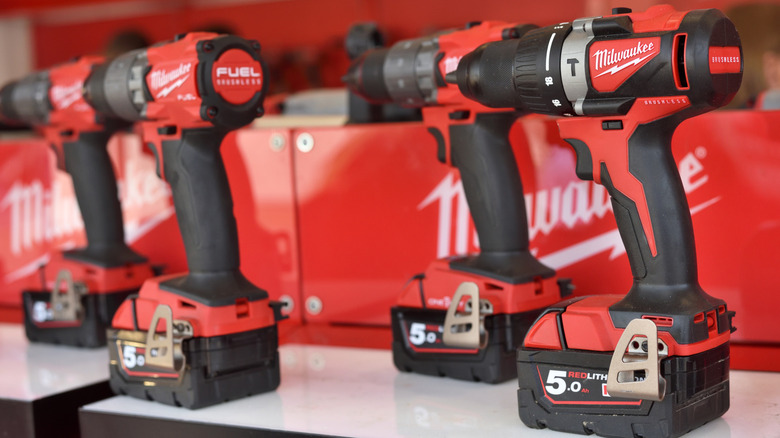Neither In The Garage Nor Shed - The Safe Place To Store Milwaukee Batteries
There are some undeniable Milwaukee tools every homeowner should have, from a basic compact drill to a handy floodlight. The great thing about this brand is that the batteries for these tools are interchangeable, meaning you can use the same battery across the entire M12 line or the entire M18 line of tools. And let's be honest — there's nothing more convenient than being able to pop in a battery and get to work immediately instead of being tethered to an electrical outlet. Many homeowners prefer to have several batteries on hand to swap them out as needed without having to stop and wait for a charge. But with so many batteries floating around, where should you store them?
You most likely haven't put a ton of consideration into the environment of a shed or garage — while they are covered spaces that protect your gear from rain and snow, they can experience extreme temperature fluctuations. It's important to understand why your garage might not be the best place to store spare batteries — both garages and sheds are actually the worst places due to extreme temperature swings and moisture. Instead, the safest place to store your Milwaukee batteries is in a temperature-controlled environment, such as a closet, basement, or climate-controlled shop.
Why where you store your batteries matters
Not only is it important that you remove batteries from power tools before storing them, but you should also put some consideration into where you store them. In the summer, when temperatures can be extreme, you run the risk of permanent capacity loss. Temperatures above 120 degrees Fahrenheit for long periods can reduce the battery's lifespan and efficiency, and prolonged extreme heat can also increase the risk of thermal runaway — in other words, a small explosion or fire. In states like Arizona, where garage or shed temperatures can reach 140 degrees Fahrenheit or more, this is a major safety risk.
On the opposite extreme, bitterly cold winter temperatures can cause internal damage to the batteries and reduce overall performance. While Milwaukee REDLITHIUM batteries are designed to operate in sub-freezing temps, the act of storing them for long periods of time can still negatively affect their internal chemistry. And since most sheds aren't insulated, they offer no protection against deep freezes.
Garages and sheds are often inadequate when it comes to moisture control. Especially in the summer when the humidity can be very high, this moisture can lead to corrosion on battery terminals and even short circuits. This could lead to complete battery failure, rendering the battery useless. For optimal performance and lifespan, storing your Milwaukee batteries in a temperature-controlled location with dry conditions is recommended.

